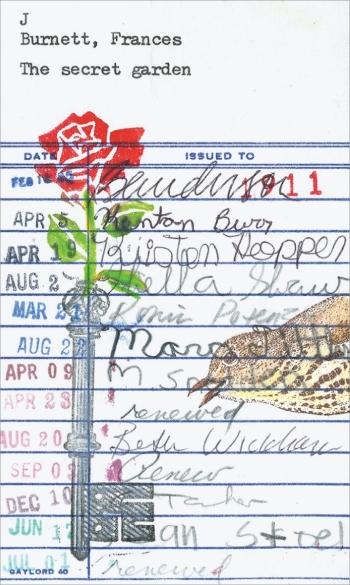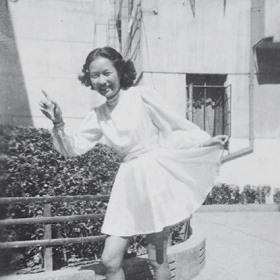Book Marks: An Artist’s Card Catalog by Barbara Page ’66 kept me up into the night reading. I did not expect that when I first picked it up, thinking of it as a straightforward art book. But interspersed among Page’s artworks through the volume are six essays chronicling different parts of her life. The art drew me to Book Marks; Page’s autobiographical writing hooked me.
I still get excited just thinking about the particular conceit of this book. It’s based on a project of Page’s for which she creates pictograms on 3-by-5-inch library checkout cards, based on books she has read. The collection, ordered according to when Page read each book and housed in a classic library file case, contains almost 700 cards now, and about half of them are reproduced in Book Marks. The cards are marked by Page and serve as markers in her reading life and “mind library,” adding layers of meaning to the word “bookmarks.”
Page writes, “By interweaving the artworks with events from my life, I hope to underscore the interplay between our experiences and our reading, and how memory shapes or reshapes each, reflecting both our lived and imagined lives.” The book also includes photographs of Page’s other artwork mentioned in her essays and some family snapshots, such as a touching picture of the artist as a toddler with her father practicing handstands on the grass outside their house.
A predominant topic in addition to reading in Book Marks is family. The images of cards throughout the book are organized to pair with the essays, and a wave of picture-book cards appear after the essay in which Page writes about becoming a mother. She is stunningly honest in recounting her life, including the intense mental-health struggles of more than one family member that have colored it.
In one of her essays, Page maps the process of aging over the trajectory of Crayola crayons, which have been made in more and more colors over the years. (When she was a child, there were only about 30 Crayola colors. Now there are more than a hundred.) “As we age,” Page writes, “we similarly drift toward ever more complexity as we continually sort ourselves into more specific tints and shades.”
Book Marks is about memory and aging and family. It is a love letter to reading and public libraries. It celebrates not just stories, but the physical book—even a specific edition—and its impact on a life. It will be a beloved volume on my bookshelf for years to come.
Ramsdell is Wellesley magazine’s student assistant, an English and creative writing major, and a photographer.








We ask that those who engage in Wellesley magazine's online community act with honesty, integrity, and respect. (Remember the honor code, alums?) We reserve the right to remove comments by impersonators or comments that are not civil and relevant to the subject at hand. By posting here, you are permitting Wellesley magazine to edit and republish your comment in all media. Please remember that all posts are public.